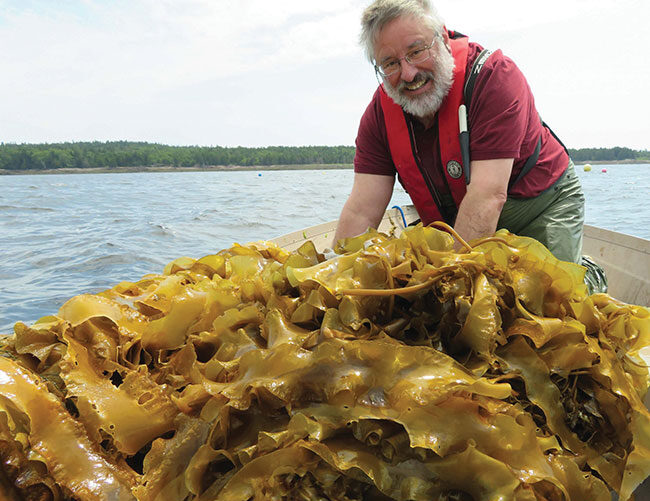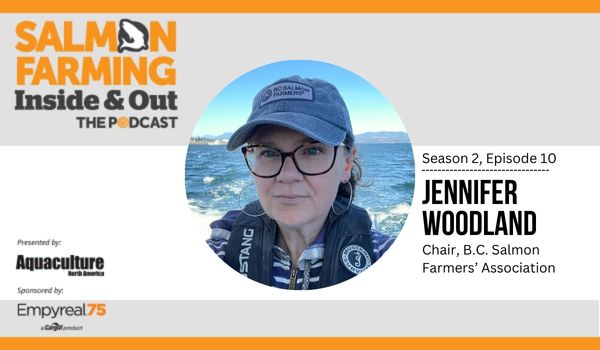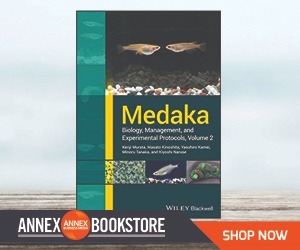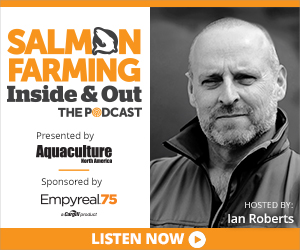| |
| |
 |
 |
| |
 |
|
@{mv_date_MMM d, yyyy}@ |
| |
|
| |
In this newsletter, we remember Thierry Chopin, the father of Integrated Multi-Trophic Aquaculture (IMTA), who passed away at 65. The seaweed aquaculture advocate wore several hats and won many awards. There's more about him in the feature section.
- Seyitan Moritiwon, Associate editor
|
|
| |
|
| |
Sustainable Fisheries Partnership (SFP) has launched a resource for companies to tackle the climate change, habitat, and biodiversity risks associated with aquaculture feed, Feed Solutions Toolkit.
» Read More...
France-based macroalgae food tech company, Marine Biologics, has received funding from the Alaska Fisheries Development Foundation’s Joint Innovations Project, to develop new ingredients from newly commercialized Alaskan kelp species.
» Read More...
Scientists from the Northeast Fisheries Science Center and the National Centers for Coastal Ocean Science have created an online tool for oyster growers in the Northeast United States to calculate how much nitrogen their farms remove from local waterways.
» Read More...
|
| |
|
| |

Ignite the potential of LeadDriver+ for precision marketing, driving brand engagement and conversions. Supported by Aquaculture North America, our first-party data approach transforms marketing strategies. Elevate your game with targeted, first party data and omnichannel impact.
» Click Here to Learn More
|
| |
|
| |
 The world of aquaculture recently honoured a tireless advocate of seaweed culture and his life’s work. Thierry Chopin, professor of Marine Biology at the University of New Brunswick in Canada and a tireless advocate of seaweed aquaculture, passed away on July 18, 2024, on Prince Edward Island in Canada. He was 65.
» Read More...
The world of aquaculture recently honoured a tireless advocate of seaweed culture and his life’s work. Thierry Chopin, professor of Marine Biology at the University of New Brunswick in Canada and a tireless advocate of seaweed aquaculture, passed away on July 18, 2024, on Prince Edward Island in Canada. He was 65.
» Read More... |
| |
 Jennifer Woodland serves as chair at B.C. Salmon Farmers’ Association. She shares an unedited update of what the B.C. salmon aquaculture looks like as it continues to navigate the uncertainties of the Canadian government’s transition plan to ban ocean net pens in British Columbia.
» Read More...
Jennifer Woodland serves as chair at B.C. Salmon Farmers’ Association. She shares an unedited update of what the B.C. salmon aquaculture looks like as it continues to navigate the uncertainties of the Canadian government’s transition plan to ban ocean net pens in British Columbia.
» Read More... |
| |
| |
|
| |

The second volume of Medaka, together with the first volume, helps to familiarize scientists with the advantages of using medaka in experimental designs, to facilitate research using medaka, and to stimulate progress by adopting medaka as a model animal. The second edition expands on the first by providing additional information to successfully raise medaka fish under stable culture conditions.
» Shop Now
|
| |
|
| |
When it comes to aquaculture, all fish are created equal – at least, as far as fish welfare is concerned. The idea that fish are sentient animals, able to experience both positive and negative sensations or feelings, may be a relatively novel — and somewhat controversial — concept.
» Read More...
Dr. Debbie Plouffe, vice president of business development at the Centre for Aquaculture Technologies, discussed the potential of genome editing in aquaculture, including improved disease management and productivity.
» Read More...
|
| |
|
| |

|
| |
|
| |
|
|
| |
| |







